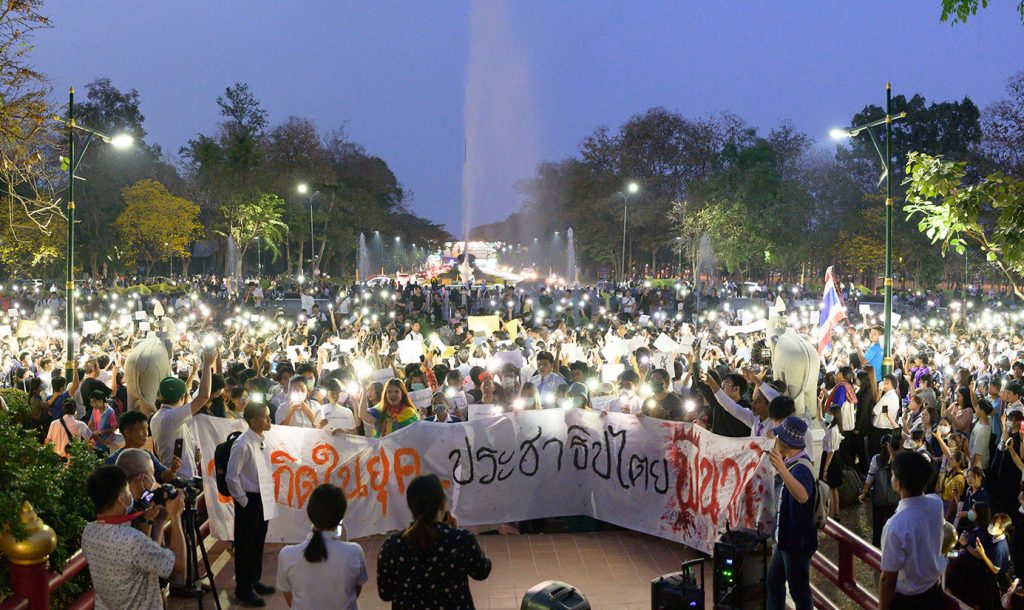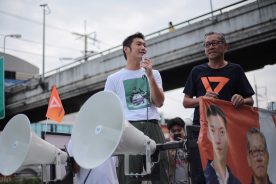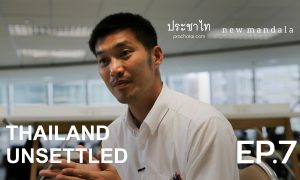Future Forward Party is dissolved. Gone is the rising star of Thai politics, all in a reading that took the Constitutional Court less than an hour. The Court also revoked the political rights of Future Forward’s executives for ten years, effectively preventing them from involvement in politics for the next decade. The dissolution case is the latest in a series of shambles where the judiciary displays its ingenuity in manoeuvring legal logics to achieve political goals.
From transition to consolidation
Since 2014, Thailand has lived under the dictatorship of Prayuth Chan-ocha, the then army commander who staged a coup against the democratic government of Yingluck Shinawatra. In 2019, the junta finally held a general election but it was not to restore democracy. It was simply a ritual to legitimise Prayuth’s transformation from a traditional military dictator to an elected autocrat. His plan could have gone smoothly, had Future Forward not entered the scene.
Inspired by the left-wing political movement, Future Forward positioned itself as anti-junta, an ideology which attracted considerable attention from younger Thais. Also contributing to its popularity was the cult of personality surrounding its founders, Thanathorn Juangroongruangkit and Piyabutr Saengkanokkul, the former a billionaire and the latter a law lecturer with critical views of the regime. The party performed exceptionally well in the election, attracting 6.3 million voters resulting in 80 seats.
For many anti-junta activists, Future Forward seemed to take over the fight for democracy from Thaksin Shinawatra’s Pheu Thai party. When the junta finished forming a government under the auspices of the proxy Phalang Pracharat Party, it began consolidating power by eliminating the opposition. Future Forward was its highest priority.
Since the Constitutional Court’s invalidation of the 2006 election, which conditioned the coup d’etat that year, the right-wing elite have perfected the judicial war machine. The subsequent 2007 and 2017 Constitutions were coloured with an obsession with clean politics, in the form of a long list of prohibitions to which political parties have had to comply or risk being dissolved. The judiciary and watchdog agencies have been occupied by anti-majoritarian figures. The regime’s propaganda machine successfully turned a sizeable part of the population into a radical violent mass who wilfully attacked progressives while following the nationalist authoritarian agenda set by the state and the army’s information operations.
The result of all of the above was ‘lawfare’. Systematically, an individual could file a complaint against a party which would be swiftly investigated by a watchdog agency. The case would then be referred to the court which would stretch the text of law beyond imagination in order to punish the accused party. Meanwhile the court enjoyed cosy protection by a harsh contempt of court law. For the past 14 years, lawfare dissolved major parties and obstructed a number of policies under the auspices of protecting the constitution and Thai democracy, leading to accusations of judicial overreach.
Lawfare against Future Forward began in earnest after the election. Three cases against the party came under the Constitutional Court’s jurisdiction. In the first, Thanathorn was accused of failing to transfer shares in a defunct magazine company to his mother before the regulatory deadline. The second case involved an accusation of attempting to overthrow democracy with the king as the head of the state. The last case related to a loan that Thanathorn had lent to the party.
In the first case, the Constitutional Court rejected evidence that the shares had been transferred, arguing that the record was suspiciously perfect. Thanathorn was disqualified from his MP status. Future Forward got off lightly from the second charge. The Constitutional Court only noted that the party’s regulations recognised democracy but failed to mention the king as the head of the state, so recommended correcting the wording. The Court did not spare Future Forward the third time.
The loan controversy
The Election Commission filed a complaint to the Constitutional Court in December so there was little time to prepare a defence. Future Forward also complained that the Court did not issue witness warrants as requested, putting the party at further disadvantage. The court date of 21 February was scheduled for just a few days before a censure debate where Future Forward was expected to grill up to six members of Prayuth’s cabinet over corruption scandals and incompetence in handling various issues (such as the COVID-19 epidemic and the PM 2.5 toxic haze).
Moreover, the case will likely be the last for a majority of the incumbent judges on the Constitutional Court. 5 out of 9 were due to retire three years ago but their terms were extended by the junta’s exceptional powers. Some of the judges had been in office since 2008 and are known for anti-liberal attitudes. Other judges were appointed by the junta’s cronies in the National Legislative Assembly after the coup. Because the Senate has already approved four new judges, the dissolution of Future Forward was the last major mission of the outgoing judges.
When it comes to the ruling itself, the two most crucial questions are (1) whether the loan has the status of a “donation” and (2) whether the party attained the money from an “illegal source”. During a session with foreign correspondents, Thanathorn had admitted to lending Future Forward 191 million baht. The initial accusation from right-wing activists was that this sum amounted to a donation exceeding the legal limit of 10 million baht. According to Section 66 of the Political Parties Act, the exceeding amount must be confiscated and party executives banned for five years.
Clearly the Election Commission conflated a loan and a donation. While Future Forward’s argument relied on the accounting standard where a loan is not income but a debt to be repaid, the court insisted instead that the loan was not income but “political revenue”. The term was puzzling and invented by the Court without further explanation. But most importantly, the Court disregarded Future Forward’s repayment plan and evidence of repayment. It argued that the interest rate for one allotment of the loan at 7.5% per annum and for another at 2% per annum were too low compared to usual business practice. Again, this reasoning was very problematic as the Court never explained how low is too low. The usual interest rate for business is 2-5%.
In any case, the Election Commission attempted to compensate for its conflation by charging Thanathorn on another count: not only was the loan a donation, but it was money obtained from an illegal source. The additional charge, under Section 72 of the Political Parties Act, carried a penalty of party dissolution and a ten-year ban for executives.
A crucial point was the Court’s understanding of the term ‘illegal’. In Thai, it may be understood as referring to serious crimes such as drug trafficking. But it may also refer to non-compliance with book-keeping rules. While most people would argue that an illegal donation is money from a criminal source, the court took a literal approach. It found that Future Forward violated electoral regulations on donations, and so the money was illegally sourced. It dissolved Future Forward and revoked the political rights of Future Forward’s executives for ten years. One judge went as far as suggesting a lifetime ban because ten years was too lenient.
Some critics have called Future Forward naïve and gullible for walking into a legal pitfall. But it is difficult, if not impossible, to avoid one when the Court takes such an arbitrary approach to legal interpretations. One legal expert has reasoned the ruling was beyond imagination. It is widely known that other parties have borrowed money but none have been punished. Most importantly, the judges ignored Future Forward’s transparency. In Thailand, where every other political party is given untold amount of money from undisclosed sources, Future Forward publicly declared its sources of funding — yet was punished by a fanatical law obsessed with creating clean politics.
When Future Forward was founded in 2018, all political activities, except those of Phalang Pracharat, were banned so fundraising was impossible. When it tried to sell souvenirs online, the Election Commission ruled against such activities, deciding that sales could only take place at the party’s HQ in Bangkok. According to one account from Future Forward, one Election Commission staff-member even suggested Thanathorn split the loan into several smaller amounts to circumvent the donation cap. He refused. Phalang Pracharat, meanwhile, has blatantly violated campaign finance regulations and many other election laws without consequence. The Election Commission was only too happy not to investigate those accusations.
Future Forward’s legacy
What may come next? The Election Commission is preparing a criminal case against the party executives. Accepting an illegal donation is punishable by up to five years in prison. Meanwhile the government is trying to co-opt newly party-less MPs.
The Thai Constitutional Court’s war on freedom of expression
While the Court has always targeted critics of the regime, it generally spared critics of its own rulings. With the rise of Future Forward Party, that's changed.
Future Forward made many mistakes, such as wasting time contesting trivial issues like parliament’s dress code. But it also proposed some policies of which Thais have long been dreaming but have been too scared to voice: the abolishment of military conscription and breaking down the alcoholic drinks oligopoly. Some moves were too idealistic, such as the attempt to set up a committee to prevent another coup, which failed to gain enough votes. Others were extremely daring, most notably voting against an emergency decree to transfer army units into the royal command. But perhaps the conservatives’ fears were exaggerated. Despite wanting to see change, the party chose the peaceful path of electoral politics. Elsewhere, Future Forward could have been labelled moderate.
Future Forward’s success in mobilising previously apolitical demographics is evident as crowds are converging on several university campuses, even the most conservative like Chulalongkorn. Younger Thais are enraged. Many used to hate Thaksin but are now disillusioned by the authoritarian alternative. Some are traumatised by their parents being brainwashed by right-winged propaganda. Most are desperate to have a good education and a decent job amid a crumbling economy, education system, and environment. Future Forward successfully convinced them to give democracy another try.
Prior to the dissolution, there was a glimmer of hope when people from all walks of life publicly begged the Constitutional Court to spare the party. The pressure was so immense that many observers were convinced that hope was possible. Now the dissolution has sent Thai youths into a direct clash with the gerontocratic establishment. It is too early to tell if the rage will explode into extended protest. It seems like the legal war machine has underestimated the wrath of the youths and accidentally broken the camel’s back. Unfortunately, some right-wing influencers have chosen to respond to the budding protests with a war cry. The conservatives are forcing Thais to go to war.
 Facebook
Facebook  Twitter
Twitter  Soundcloud
Soundcloud  Youtube
Youtube  Rss
Rss 



